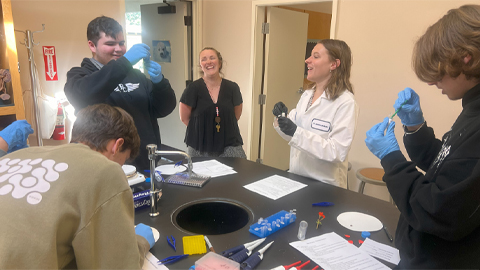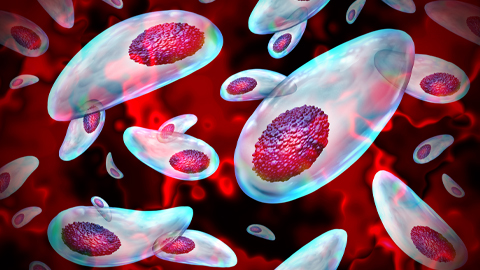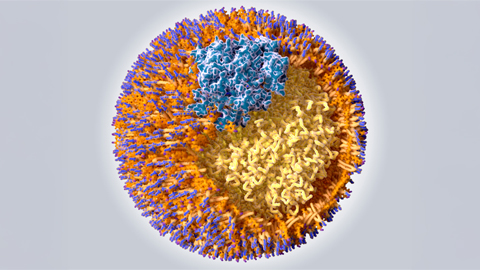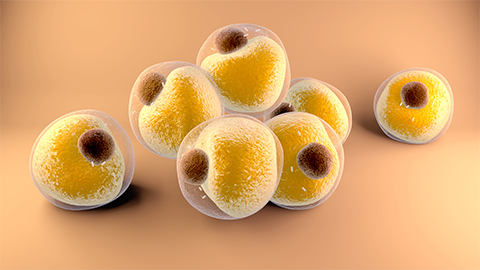Assessing the risk of excess folic acid intake
It is well established that folic acid supplementation can significantly reduce the risk of birth defects, including neural tube defects like spina bifida, the most common birth defect of the central nervous system and the second most common of all structural birth defects. More than 80 nations, including the U.S. 25 years ago, have established mandated folic acid food fortification programs, which have been successful.
“However, there is a lack of research on whether excessive folic acid intake has the potential to harm human beings,” said co-corresponding author, Dr. Richard H. Finnell, William T. Butler, M.D., Distinguished Chair Professor in the Center for Precision Environmental Health and the departments of molecular and cellular biology, molecular and human genetics and medicine at Baylor College of Medicine.

There are reports of adverse effects associated with high folate intake in humans. In this study published in the journal Cell Discovery, Finnell and his colleagues investigated in an animal model the potential effect of folic acid supplementation on DNA mutation rates and other genetic modifications such as whole genome methylation, which can change how much of any given gene product gets expressed in cells.
The animals received one of three folic-acid-supplemented diets: folic acid low, folic acid control and folic acid high. “Compared to the mutation frequency of the folic acid-control diet group, that of the folic acid-low diet group increased two-fold and the folic acid-high diet group increased 1.8 fold,” Finnell said.
The researchers found that DNA repair genes were significantly hypermethylated in the folic acid-high diet, suggesting that excess folic acid supplementation may affect the mutation rate by reducing the expression of DNA repair genes and consequently impairing DNA repair activity. Understanding these mechanisms requires further investigation.
“The effects of high- or low-folic acid diets should be confirmed in human population in future studies,” Finnell said. “Our data supports that folic acid supplementation should be restricted to an ideal benefit range. What we have here is a “Goldilocks Effect”: Too little or too much of a good thing (folic acid) may not be such a good thing.”
This article first appeared on the Baylor College of Medicine news site. Read the original.
Enjoy reading ASBMB Today?
Become a member to receive the print edition four times a year and the digital edition monthly.
Learn moreGet the latest from ASBMB Today
Enter your email address, and we’ll send you a weekly email with recent articles, interviews and more.
Latest in Science
Science highlights or most popular articles

E-cigarettes drive irreversible lung damage via free radicals
E-cigarettes are often thought to be safer because they lack many of the carcinogens found in tobacco cigarettes. However, scientists recently found that exposure to e-cigarette vapor can cause severe, irreversible lung damage.

Using DNA barcodes to capture local biodiversity
Undergraduate at the University of California, Santa Barbara, leads citizen science initiative to engage the public in DNA barcoding to catalog local biodiversity, fostering community involvement in science.

Targeting Toxoplasma parasites and their protein accomplices
Researchers identify that a Toxoplasma gondii enzyme drives parasite's survival. Read more about this recent study from the Journal of Lipid Research.

Scavenger protein receptor aids the transport of lipoproteins
Scientists elucidated how two major splice variants of scavenger receptors affect cellular localization in endothelial cells. Read more about this recent study from the Journal of Lipid Research.

Fat cells are a culprit in osteoporosis
Scientists reveal that lipid transfer from bone marrow adipocytes to osteoblasts impairs bone formation by downregulating osteogenic proteins and inducing ferroptosis. Read more about this recent study from the Journal of Lipid Research.

Unraveling oncogenesis: What makes cancer tick?
Learn about the ASBMB 2025 symposium on oncogenic hubs: chromatin regulatory and transcriptional complexes in cancer.

